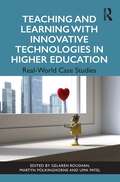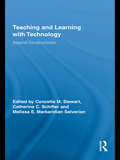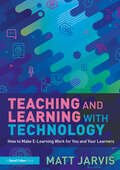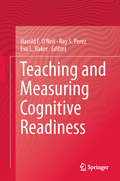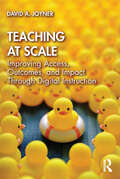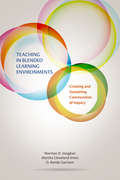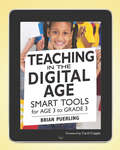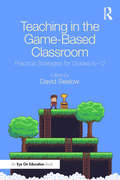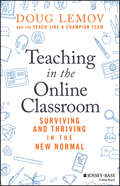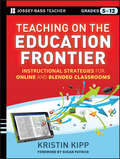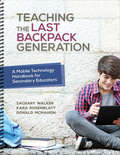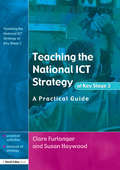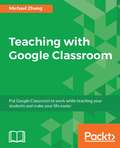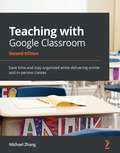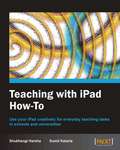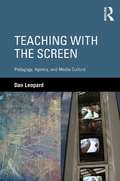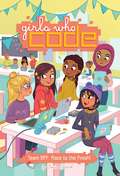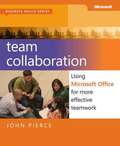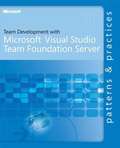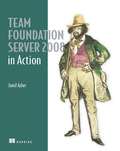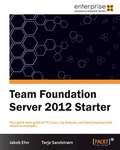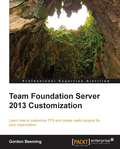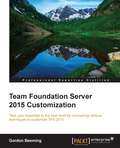- Table View
- List View
Teaching and Learning with Innovative Technologies in Higher Education: Real-World Case Studies
by Gelareh Roushan Martyn Polkinghorne Uma PatelTeaching and Learning with Innovative Technologies in Higher Education provides a wealth of expertly curated case studies demonstrating how educators and technologists can leverage emerging digital technologies to enhance students’ experiences. As university staff integrate transformative digital learning tools into their pedagogical practices with a mix of excitement and consternation, new insights are needed into the opportunities, success and limitations of these fast-evolving tools. This book presents real-world examples of effective, digitally enriched approaches to teaching delivery and standards, student engagement and inclusivity, immersive simulations and environments and beyond. Spanning a diverse, comprehensive range of digital technologies deployed in higher education, these practical case studies will guide novice and experienced academics across disciplines in updating their instructional skills and course content for new generations of learners.
Teaching and Learning with Technology: Beyond Constructivism (Routledge Research in Education #Vol. 37)
by Concetta M. StewartToday, new media is both augmenting and extending the traditional classroom with a variety of technology-based tools available to both students and faculty, and has created "new" virtual classrooms for anywhere, anytime availability to education. Despite the enormous potential for technology to support the educational enterprise in this emerging "creative" economy, technologies are still not yet fully integrated in the classroom and their association with educational outcomes is as-yet unclear. This book profiles scholarly work from around the world to examine closely the effectiveness of the newest media in education at bridging the gaps among and between teachers, students and subject matter at all levels, from K-12 through adult education. These pieces are theory-based investigations with implications for future research, theory and application. Contributors examine how the fields of education and new media have evolved and are continuing to evolve pedagogically and practically, from predominantly instructivist, with a passive, one-way teaching format; to constructivist, including teacher- and learner-controlled, sensorially immersive and socially interactive exchanges. This book will be of interest to students and faculty in the areas of new media in education, including distance learning, online learning and "virtual" learning.
Teaching and Learning with Technology: How to Make E-Learning Work for You and Your Learners
by Matt JarvisTeaching and Learning with Technology sets out key principles for digital learning underpinned by research evidence. It explores the ways in which technology can help teachers to achieve their goals and support good pedagogy and offers practical strategies for using technology when planning and delivering effective lessons. Drawing on examples from across the curriculum and highlighting a wide range of key technologies, chapters cover: Live remote teaching Delivering content and instruction Using technology to assess learning Alternative learning platforms Ensuring accessibility and personalising learning E-safety, safeguarding and legal compliance Written by a leading expert in digital education and filled with easy-to-implement tips, this book is an essential guide for all teachers delivering lessons online.
Teaching and Measuring Cognitive Readiness
by Eva L Baker Ray S. Perez Harold F. O'NeilTeaching and Measuring Cognitive Readiness presents theoretical and empirical findings regarding cognitive readiness and assessments of their impact on adult learning. The term readiness is used in assessing student preparation for K-12 schools, while in the military and in industry, "readiness" denotes preparation to be effective in performing a mission or a job. Cognitive Readiness is viewed through a Knowledge, Skills, and Attributes (KSA) lens. Teaching and Measuring Cognitive Readiness deals with (a) the primacy of cognitive readiness as attributes or individual difference variables; (b) the need for cognitive readiness instructional and assessment strategies; (c) the need to integrate assessment into cognitive readiness training; (d) the need for theory-driven evaluation studies to increase knowledge and efficacy in teaching cognitive readiness; and (e) the need for a solid psychometric approach to the use of cognitive readiness assessments.
Teaching at Scale: Improving Access, Outcomes, and Impact Through Digital Instruction
by David A. JoynerTeaching at Scale explores the characteristics and parameters of large-scale online learning by identifying, in its perceived drawbacks, a wealth of educational opportunities in disguise. Scalable learning platforms have exploded in popularity over recent years, with MOOCS (massive open online courses), online degree programs, informal learning communities, and alternative credentials all drawing significant enrollments. But, as many educators are asking, are the challenges to delivering education at scale too great and the compromises too many? This book guides instructors to leverage their complex responsibilities—open-ended assessments at scale, individuated feedback to students, academic integrity in less controlled environments, and more—into significant assets. Informed by real-world institutional experience as well as key research in cognitive science and the learning sciences, each chapter provides practical strategies for educators and administrators seeking to solve problems and fulfill the high-quality, broad-access potential of large-scale instruction for lifelong learners.
Teaching at Scale: Improving Access, Outcomes, and Impact Through Digital Instruction
by David JoynerTeaching at Scale explores the characteristics and parameters of large-scale online learning by identifying, in its perceived drawbacks, a wealth of educational opportunities in disguise. Scalable learning platforms have exploded in popularity over recent years, with MOOCS (massive open online courses), online degree programs, informal learning communities, and alternative credentials all drawing significant enrollments. But, as many educators are asking, are the challenges to delivering education at scale too great and the compromises too many? This book guides instructors to leverage their complex responsibilities—open-ended assessments at scale, individuated feedback to students, academic integrity in less controlled environments, and more—into significant assets. Informed by real-world institutional experience as well as key research in cognitive science and the learning sciences, each chapter provides practical strategies for educators and administrators seeking to solve problems and fulfill the high-quality, broad-access potential of large-scale instruction for lifelong learners.
Teaching in Blended Learning Environments: Creating and Sustaining Communities of Inquiry
by D. Randy Garrison Norman D. Vaughan Martha Cleveland-InnesTeaching in Blended Leaning Environments provides a coherent framework in which to explore the transformative concept of blended learning. Blended learning can be defined as the organic integration of thoughtfully selected and complementary face-to-face and online approaches and technologies. A direct result of the transformative innovation of virtual communication and online learning communities, blended learning environments have created new ways for teachers and students to engage, interact, and collaborate. The authors argue that this new learning environment necessitates significant role adjustments for instructors and generates a need to understand the aspects of teaching presence required of deep and meaningful learning outcomes. Built upon the theoretical framework of the Community of Inquiry – the premise that higher education is both a collaborative and individually constructivist learning experience – the authors present seven principles that provide a valuable set of tools for harnessing the opportunities for teaching and learning available through technology. Focusing on teaching practices related to the design, facilitation, direction and assessment of blended learning experiences, Teaching in Blended Learning Environments addresses the growing demand for improved teaching in higher education.
Teaching in the Digital Age
by Carol Copple Brian PuerlingTechnology is rapidly changing the ways we live our lives and interact with the world. It's also changing how you teach. Technology can enhance your classroom's complete curriculum and assessment and help you create and capture meaningful experiences, support inquiry, and expand your classroom's walls. This comprehensive framework will help you select and use a variety of technology and interactive media tools in your classroom-including digital cameras, audio recorders, webcams, publication and presentation tools, and multi-touch mobile devices.Reflecting Technology in Early Childhood Programs, the joint position statement of the National Association for the Education of Young Children and the Fred Rogers Center, Teaching in the Digital Age: Smart Tools for Age 3 to Grade 3 includesDevelopmentally appropriate and effective strategies to use technology to facilitate children's learning28 links to video clips that provide a deeper look at how these practices are used in real classrooms32 forms to help you plan, reflect on, and evaluate how you use technology to help children learnBrian Puerling, a National Board Certified Teacher and graduate of the Erikson Institute, is the Director of Education Technology at the Catherine Cook School in Chicago. He is a former preschool teacher, a member of the National Association for the Education of Young Children's Tech and Young Children Interest Forum, serves on the Sesame Workshop Teacher Council, is active with the Chicago Metro Association for the Education of Young Children, and is a popular presenter at national conferences.
Teaching in the Game-Based Classroom: Practical Strategies for Grades 6-12
by David SeelowTeaching in the Game-Based Classroom is a hands-on guide to leveraging students’ embrace of video games toward successful school performance. Evidence tells us that game-based learning can help teachers design classes, develop transformative learning tools, and assess progress on multiple levels not dependent on one-size-fits-all bubble sheets. Authored by game-savvy teachers in partnership with classroom-experienced academics, the highly varied chapters of this book are concise yet filled with sound pedagogical approaches. Middle and high school educators will find engaging new ways of inspiring students’ intrinsic motivation, skill refinement, positive culture-building, autonomy as learners, and more.
Teaching in the Online Classroom: Surviving and Thriving in the New Normal
by Doug LemovA timely guide to online teaching strategies from bestselling author Doug Lemov and the Teach Like a Champion team School closures in response to the covid-19 coronavirus pandemic resulted in an immediate and universal pivot to online teaching. More than 3.7 million teachers in the U.S. were suddenly asked to teach in an entirely new setting with little preparation and no advance notice. This has caused an unprecedented threat to children's education, giving rise to an urgent need for resources and guidance. The New Normal is a just-in-time response to educators’ call for help. Teaching expert Doug Lemov and his colleagues spent weeks studying videos of online teaching and they now provide educators in the midst of this transition with a clear guide to engaging and educating their students online. Although the transition to online education is happening more abruptly than anyone anticipated, technology-supported teaching may be here to stay. This guide explores the challenges involved in online teaching and guides educators and administrators to identify and understand best practices. It is a valuable tool to help you and your students succeed in synchronous and asynchronous settings this school year and beyond. Learn strategies for engaging students more fully online Find new techniques to assess student progress from afar Discover tools for building online classroom culture, combating online distractions, and more Watch videos of teachers building rigor and relationships during online instruction The New Normal features real-world examples you can apply and adapt right away in your own online classroom to allow you to survive and thrive online.
Teaching on the Education Frontier: Instructional Strategies for Online and Blended Classrooms Grades 5-12
by Kristin KippA groundbreaking guide to facilitating online and blended courses This comprehensive resource offers teachers in grades K-12 a hands-on guide to the rapidly growing field of online and blended teaching. With clear examples and explanations, Kristin Kipp shows how to structure online and blended courses for student engagement, build relationships with online students, facilitate discussion boards, collaborate online, design online assessments, and much more. Shows how to create a successful online or blended classroom Illustrates the essential differences between face-to-face instruction and online teaching Foreword by Susan Patrick of the International Association for K-12 Online Learning This is an essential handbook for learning how to teach online and improve student achievement.
Teaching the Last Backpack Generation: A Mobile Technology Handbook for Secondary Educators
by Zachary Walker Kara Rosenblatt Don McMahonDon’t just know how to use mobile technology. Know how to use it to transform learning. This refreshingly easy-to-use workbook shows how to make mobile devices a natural part of lessons, no matter the content. Discover practical device management skills, fun strategies students will love, and helpful resources to extend professional learning.
Teaching the Last Backpack Generation: A Mobile Technology Handbook for Secondary Educators
by Zachary Walker Kara Rosenblatt Don McMahonDon’t just know how to use mobile technology. Know how to use it to transform learning. This refreshingly easy-to-use workbook shows how to make mobile devices a natural part of lessons, no matter the content. Discover practical device management skills, fun strategies students will love, and helpful resources to extend professional learning.
Teaching the National ICT Strategy at Key Stage 3: A Practical Guide
by Clare Furlonger Susan HaywoodFirst Published in 2005. Routledge is an imprint of Taylor & Francis, an informa company.
Teaching with Google Classroom
by Michael ZhangPut Google Classroom to work while teaching your students and make your life easier About This Book * This is the first book to guide educators step by step through teaching with Google Classroom * It's focused on you, your students, and providing great learning experiences easily * It's easy to follow, with everything you need to get started and keep going even if you're not a technology fan Who This Book Is For This is a book for educators who want to use Google Classroom to teach better. It's not for geeks. There are rich examples, clear instructions, and enlightening explanations to help you put this platform to work. What You Will Learn * Create a Google Classroom and add customized information for each individual class * Add students to a Google Classroom * Send announcements and questions to students * Create, distribute, collect, and grade assignments through Google Classroom * Add events to and share a Google Classroom's calendar with parents to track a student's progress * Reuse posts, archive classrooms, and perform other administrative tasks in Google Classroom * Use Google Docs Add-ons, and Google Chrome Webstore Apps and Extensions to enhance assignments * Set up Google Classroom's mobile app In Detail Google Classroom helps teachers bring their work online. According to Google Trends, it's already bigger than Moodle after barely a year in the wild. This book is a complete start-to-finish guide for teachers using Google Classroom for the first time. It explains what Google Classroom is, what it can do, how to set it up, and how to use it to enhance student learning while making your life as a teacher easier. It shows you how to place resources and activities online, gather assignments, and develop group and individual activities. It's not just a manual, you'll also discover inspiring, easy ways to put Google Classroom to work for you and your class. Style and approach This is a step-by-step guide to using Google Classroom, the rapidly emerging platform for education, effectively.
Teaching with Google Classroom: Save time and stay organized while delivering online and in-person classes, 2nd Edition
by Michael ZhangBuild interactive courses for online learning using Google's learning management solutionKey FeaturesDiscover best practices for developing a creative educational experience using the features of Google ClassroomGet to grips with the modern features of Google Classroom that can help you meet the demands of online teachingCreate online courses and deliver classes in an interactive mannerBook DescriptionGoogle Classroom is designed to help you manage and deliver online and in-person courses in an interactive manner. Using Google Classroom saves time organizing and communicating information to students and parents. This updated second edition of Teaching with Google Classroom covers the modern features of Google Classroom that meet the current needs of online teaching. The book is written from the high-school perspective but is applicable to teachers and educators of all age groups. If you're new to Google Classroom or an experienced user who wants to explore more advanced methods with Google Classroom, this book is for you. With hands-on tutorials, projects, and self-assessment questions, you'll learn how to create classes, add students to those classes, send announcements, and assign classwork. The book also demonstrates how to start an online discussion with your students. Later, you'll discover how you can involve parents by inviting them to receive guardian emails and sharing Google Calendar with a URL. This will help them to view assignment deadlines and other important information. The book goes step by step through all the features available and examples of how best to use them to manage your classroom. By the end of this book, you'll be able to do more with Google Classroom, managing your online or in-person school classes effectively.What you will learnCreate a classroom and add customized information for each individual classSend announcements and questions to studentsCreate, distribute, collect, and grade assignments through Google ClassroomLink student accounts to guardian emails for daily or weekly updatesUse Google Forms to create quizzes that automatically grade and return results to studentsReuse posts, archive classrooms, and perform other administrative tasks in Google ClassroomHost online sessions with students and set up Google Classroom's mobile appWho this book is forThis Google Classroom book is written by an educator, for educators. It's for anyone who wants to teach effectively with Google Classroom. There are rich examples, clear instructions, and enlightening explanations to help you put this platform to work.
Teaching with iPad How-to
by Sumit Kataria Shubhangi HarshaTeaching with iPad how-to is a crisp and systematic guide organized into various step-by-step recipes that will enable you to utilize the power of your iPad to make your daily teaching tasks easy and interesting. This book is ideal for school and university teachers who have access to an iPad and are willing to make their profession all the more fun and easy for themselves. It is assumed that the reader has basic knowledge of how to use the iPad, access the Appstore and download apps.
Teaching with the Screen: Pedagogy, Agency, and Media Culture
by Dan LeopardTeaching with the Screen explores the forms that pedagogy takes as teachers and students engage with the screens of popular culture. By necessity, these forms of instruction challenge traditional notions of what constitutes education. Spotlighting the visual, spatial, and relational aspects of media-based pedagogy using a broad range of critical methodologies–textual analysis, interviews, and participant observation–and placing it at the intersection of education, anthropology, and cultural studies, this book traces a path across historically specific instances of media that function as pedagogy: Hollywood films that feature teachers as protagonists, a public television course on French language and culture, a daily television "news" program created by high school students, and a virtual reality training simulation funded by the US Army. These case studies focus on teachers as pedagogical agents (teacher plus screen) who unite the two figures that have polarized earlier debates regarding the use of media and technology in educational settings: the beloved teacher and the teaching machine.
Team BFF: Race to the Finish! #2
by Stacia Deutsch Reshma SaujaniPerfect for fans of The Babysitters Club and anyone interested in computer science, this book by New York Times bestselling author Stacia Deustch is published in partnership with the organization Girls Who Code!Sophia and her coding club BFFs have the best time together. Sure, they work on coding projects, but mostly they gossip about crushes, eat cookies, and do totally silly impersonations. Now they’re about to participate in their first hackathon--a full day of coding and meeting other coders—so it’s time to step up their game! Just when Sophia and her friends think their hackathon project is ready for the big time, a change of plans threatens to tear their group apart. Will they have each other’s backs, or are they destined for an epic fail? They know that coding is all about teamwork and problem-solving—maybe friendship is, too!
Team Collaboration: Using Microsoft® Office for More Effective Teamwork
by John Pierce<p>Whether coordinating a cross-team project or leading your workgroup, discover how to enable your team’s best work using Microsoft Office.</p>
Team Development with Visual Studio® Team Foundation Server
by Microsoft CorporationThis guide shows you how to get the most out of Visual Studio 2005 Team Foundation Server to help improve the effectiveness of your team-based software development. Whether you are already using Team Foundation Server or adopting from scratch, you'll find guidance and insights you can tailor for your specific scenarios.
Team Foundation Server 2008 in Action
by Jamil AzherIn complex software projects, managing the development process can be as critical to success as writing the code itself. A project may involve dozens of developers, managers, architects, testers, and customers, hundreds of builds, and thousands of opportunities to get off-track. To keep tabs on the people, tasks, and components of a medium- to large-scale project, most teams use a development system that allows for easy monitoring, follow-up, and accountability.Microsoft Team Foundation Server 2008 (TFS), the server component of Microsoft's Visual Studio Team System (VSTS), provides a powerful collaborative platform for software-development teams. The product offers an integrated toolset for tracking work items, creating test cases, managing source code, generating builds, constructing database schemas, and so on. Because in software development one size does not fit all, TFS provides process customization, project management, and reporting capabilities to build solutions around your requirements.Team Foundation Server 2008 in Action is a hands-on guide to Team Foundation Server 2008. Written for developers with a good handle on TFS basics, this book shows you how to solve real-life problems. It's not a repetition of Microsoft's product documentation. Team Foundation Server 2008 in Action is a practitioner's handbook for how to work with TFS under common constraints. This book walks you through real-life software engineering problems based on hundreds of hours of TFS experience.You'll benefit from expert author Jamil Azher's extensive interactions with members of Microsoft's TFS team and MVPs, survey feedback from the author's blog, and interviews with organizations and user groups using TFS. Instead of just offering a high-level overview, the book provides detailed solutions for solving common-and not-so-common-problems using TFS. It discusses the strengths as well as weaknesses of TFS, and suggests appropriate problem resolution steps, workarounds, or custom solutions. Purchase of the print book comes with an offer of a free PDF, ePub, and Kindle eBook from Manning. Also available is all code from the book.
Team Foundation Server 2012 Starter
by Terje Sandstrom Jakob EhnThis Starter guide is a short, sharp introduction to Team Foundation Server 12, covering everything you need to get up and running. If you are a developer, project lead, tester, or IT administrator working with Team Foundation Server 2012 this guide will get you up to speed quickly and with minimal effort.
Team Foundation Server 2013 Customization
by Gordon Beeminghis book utilizes a tutorial based approach, focused on the practical customization of key features of the Team Foundation Server for collaborative enterprise software projects. This practical guide is intended for those who want to extend TFS. This book is for intermediate users who have an understanding of TFS, and basic coding skills will be required for the more complex customizations.
Team Foundation Server 2013 Customization
by Gordon Beeminghis book utilizes a tutorial based approach, focused on the practical customization of key features of the Team Foundation Server for collaborative enterprise software projects. This practical guide is intended for those who want to extend TFS. This book is for intermediate users who have an understanding of TFS, and basic coding skills will be required for the more complex customizations.
